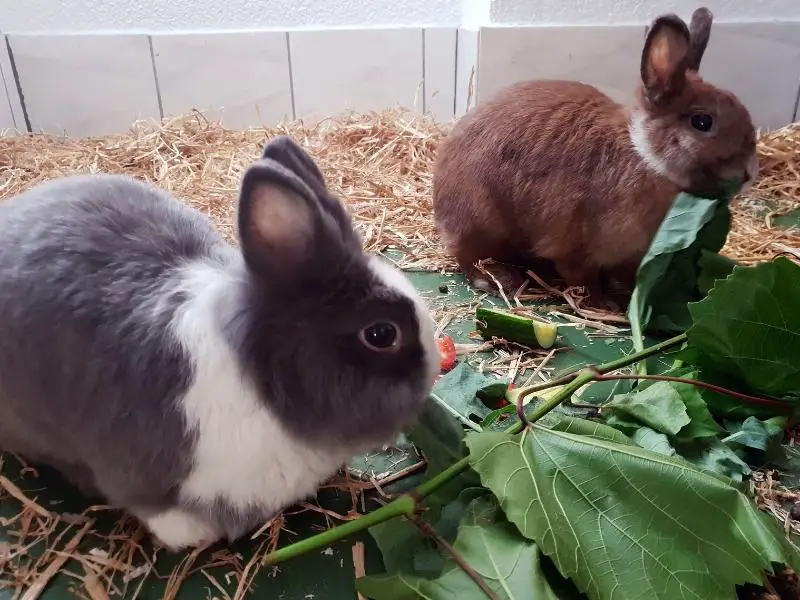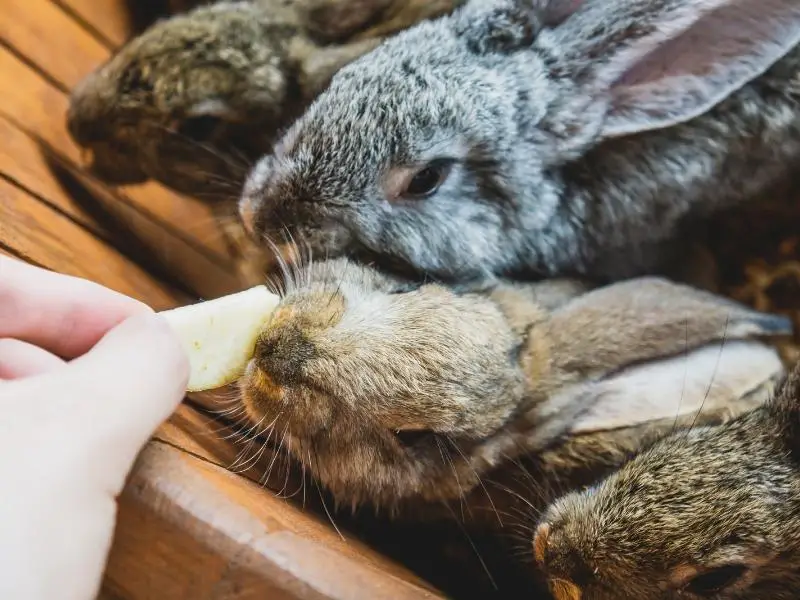Have you ever filled up your buns’ food dish and noticed that they hadn’t touched their food? At first, you might think they are just not in the mood to eat or it’s too hot that day. But then you notice their tummy is swelling, and they aren’t as eager to see you. Now you’re becoming concerned.
How long can rabbits go without eating before it’s an emergency?
Rabbits should never go without food for more than 10 hours. Not eating can lead to gastrointestinal stasis (GI stasis), which will cause the digestive system to slow down, resulting in gas build-up and pain. By nature, rabbits are grazers, which means they need to eat continuously to survive.
If your bun has suddenly lost its appetite, this guide will provide all the information you need on how long rabbits can go without eating.
How Long Can a Rabbit Go Without Food?
Your healthy adult bun can go without food for around three to four days (at a push) before dying. Older (senior buns), underweight rabbits, and kits (baby rabbits) might not make it past 12 hours without food.
As a rule, your bun should never go without food for more than 10 hours.
If your rabbit hasn’t eaten for 10 hours, it can develop gastrointestinal stasis, which can be fatal. Rabbits are herbivores, which means their diet consists of plants and hay.
They have fragile digestive systems that are designed for grazing.
Rabbits are monogastric (one stomach) animals and hind-gut fermenters. Their stomachs function similarly to cows, but the cecum is found at the end of the digestive tract.
This is why your bun needs to continuously nibble on hay, grass, and pellets for its digestive tract to work properly.
What Happens If a Rabbit Doesn’t Eat for 24 hours?

Based on your bun’s size, health, and age, if your floppy-eared friend hasn’t eaten in 24 hours, they can develop severe GI stasis.
Their digestive system will slow down drastically and can even stop. If this happens and is left untreated, they can die.
As a result of their digestive system slowing down, their stomachs will dehydrate, and they’ll struggle to pass food through the digestive tract.
Your bun will then suffer from bloating and gas, which develops from a build-up of bacteria in the gut.
Here’s a look at some of the symptoms caused by GI stasis:
- Obvious lethargy
- Grinding their teeth excessively
- Hunched over in pain
- Soft stool and diarrhea
- Gas build-up and bloating
- Loss of appetite
- Stools become dry, and there are many fewer poop balls than usual
If your rabbit refuses to eat or hasn’t eaten in 24 hours and is displaying any of the above symptoms, you need to get them to the vet immediately.
What Happens If a Rabbit Doesn’t Eat for 3 Days?
If your floppy-eared friend goes for three days without food, you need to seek veterinary assistance urgently, as this is a serious concern.
A rabbit’s digestive system needs a constant supply of food (small amounts at a time) to keep its digestive system in optimal condition.
The longer a rabbit goes without food, the quicker its digestive system shuts down. The pain that comes with GI stasis causes your bun to eat even less, which can lead to even more serious conditions such as:
- Intestinal or gut blockage
- Severe dehydration
- Liver disease
- Hypoglycemia (low blood sugar levels)
The situation is critical if your bun has gone this long without eating anything. If they aren’t treated fast enough, they can die.
Your bun’s sugar levels will also drop drastically, which leaves them feeling lethargic and too tired to move.
How Long Is it Okay for Rabbits Not to Eat?
Since rabbits are grazers, they should not stop eating. Anything over 10 hours should be treated as an emergency. Eating a little less is still okay, but completely stopping is potentially a critical situation.
Your bun might be ill, and this has caused them to lose their appetite and stop eating. Look out for these symptoms if you suspect your bun is sick:
- A drastic change in urinating and pooping habits
- Stays in a hunched-over position
- Off balance
- Snotty nose and sneezing
- Sudden aggressive behavior
Let’s take a look at some of the reasons why your bun may not be eating:
1. Dental problems such as tooth abscesses can cause pain and discomfort.
2. Stress and anxiety can cause a rabbit to lose their appetite.
3. Introducing new food to your bun’s diet can also affect their eating habits.
4. Gut blockage and GI stasis are two of the most common causes
How Often Should You Feed Your Rabbit?
You must feed your bun daily. They need access to an unlimited amount of hay. Chewing on hay is good for their digestion and helps keep their teeth filed down.
Your bun requires a balanced diet that should consist of the following:
- Timothy grass hay – 80%
- Leafy green veggies and fruit – 10%
- Good-quality pellets – 5%
- Treats – 0-5%
Here’s a guideline on how much rabbits should eat in a day:
- Small rabbits (such as the Netherland Dwarf) need 1 cup of leafy greens and around 2 tablespoons of pellets daily.
- Medium-sized rabbits (such as the German Angora) need 4 cups of leafy greens and ½ cup of pellets daily.
- Large rabbits (such as a Flemish Giant) need 5 cups of leafy greens and ½ pellets daily.
My Last Bunny Thoughts
Bunnies cannot tell you when they aren’t feeling well, so it’s vital to try to find out why your rabbits aren’t eating. Loss of appetite clearly indicates that something is wrong with your floppy-eared friend (whether it’s related to their health or mental state).
If you’re going away for a weekend or a couple of days, it’s essential to ensure that your bun has access to enough food and water.
If they go hungry for over 10 hours, your bun’s health can take a massive knock at a fast rate. Rabbits can’t live without food.
That being said, there is also a fine line between feeding your bun and overfeeding them. If a rabbit eats more than the recommended amount, it can develop other health issues, such as diabetes and obesity.
Related Articles:

